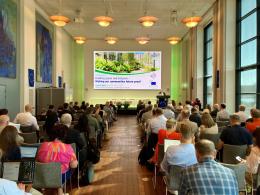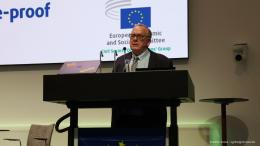European Economic
and Social Committee
Evropski zeleni dogovor
Evropska komisija je 11. decembra 2019 začela izvajati evropski zeleni dogovor, s katerim je okrepila zavezo EU, da bo obravnavala podnebne in okoljske izzive, ki so bistvena naloga te generacije. Cilj evropskega zelenega dogovora je preoblikovati EU v sodobno, z viri gospodarno in konkurenčno gospodarstvo, in zagotoviti, da:
- bodo do leta 2050 dosežene ničelne neto emisije toplogrednih plinov,
- bo dosežena gospodarska rast, ki ne bo vezana na izkoriščanje virov,
- nobena oseba ali kraj ne bosta prezrta.
EU za uresničitev evropskega zelenega dogovora izvaja celovit sveženj pobud, vključno s političnimi in zakonodajnimi predlogi ter razvojem in posodobitvijo instrumentov financiranja.
EESO poziva k zelenemu in socialnemu dogovoru ter poudarja tesno povezavo med zelenim dogovorom in socialno pravičnostjo. Nujno je treba slišati glas vseh deležnikov, da bi spodbudili razvoj trajnostnih in konkurenčnih podjetij prihodnosti v zdravem okolju.
V evropskem zelenem dogovoru je velik poudarek na naložbah ter financiranju zelenega in trajnostnega prehoda. Zeleni dogovor je za Evropo rešilna bilka za izhod iz pandemije COVID-19. Financiran bo s tretjino od 1,8 bilijona evrov naložb iz načrta za okrevanje NextGenerationEU in s sredstvi sedemletnega proračuna EU. Namen tega povečanja možnosti financiranja je krizo pretvoriti v priložnost za preobrazbo za prihodnost Evrope.
EESO ima ključno vlogo pri spremljanju izvajanja pobud in ukrepov evropskega zelenega dogovora. EESO pripravlja mnenja in organizira dejavnosti (glej stranski meni na levi strani), s katerimi zagotavlja, da institucije EU upoštevajo stališča organizirane civilne družbe in da so pobude zelenega dogovora skladne z gospodarskimi, socialnimi in družbenimi okoliščinami v praksi.
Evropski zeleni dogovor zaradi njegove horizontalne in vseobsegajoče narave pokrivajo vse strokovne skupine EESO in komisija CCMI.



